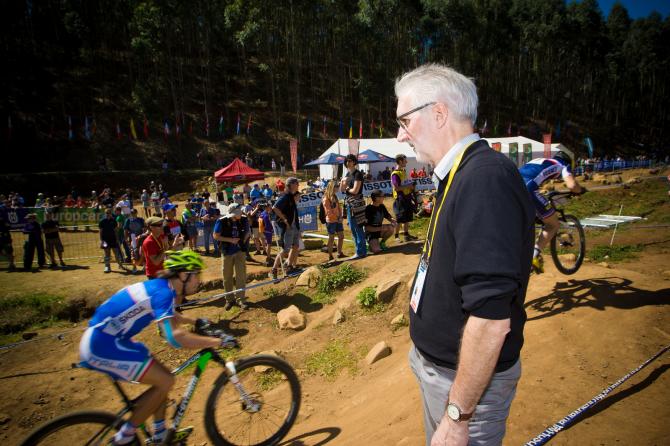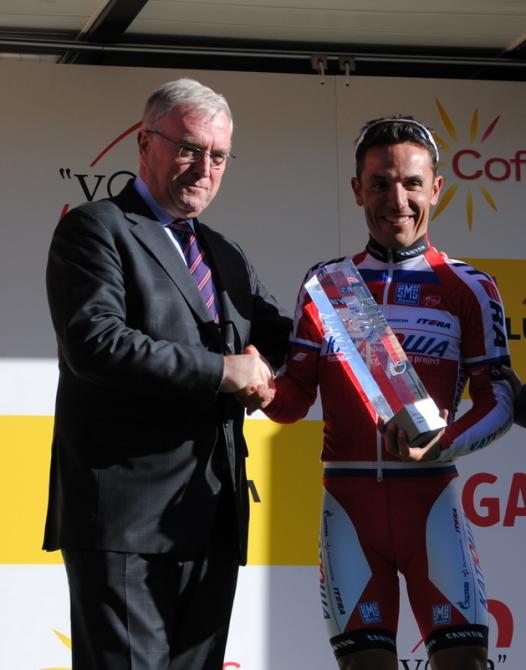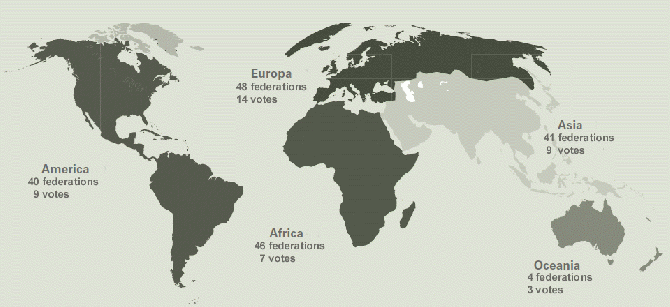The UCI Presidential Election Explained
Who votes? Can McQuaid hang on? How can Cookson win?



It's the moment the cycling world's been waiting for, the moment when the incumbent president, Pat McQuaid, faces off against his challenger, Brian Cookson, in the final battle for the presidency of the UCI. For the last few months each candidate has been hacking away at the other through the media, now, finally, they face the voters in Friday's election.
McQuaid backtracks on Lance Armstrong statement
McQuaid email to Garmin-Sharp's Jonathan Vaughters
Opinion: Why I would vote for Brian Cookson
McQuaid says he will walk away if defeated in UCI presidential election
Cookson confident of a majority vote for UCI president
St. Lucia federation accuses Cookson campaign of subversive election tactics
Who votes?
Forty-two delegates, drawn from the five confederations representing the UCI's hundred-seventy-nine members, get to decide who will govern the sport for the next four years. Those voters are as follows:
Europe – Austria (Rudolf Massak), Belgium (Thierry Maréchal), Czech Republic (Slavomir Svoboda), France (Patrice Roy), Germany (Toni Kirsch), GB (Charles Jackson), Italy (Giovanni Duci), Luxembourg (Jean Regenwetter), Monaco (Umberto Langelotti), Netherlands (Marcel Wintels), Norway (Harald Tiedemann Hansen), Russia (Victoria Lesnikova), Slovakia (Peter Privara), and Sweden (Yvonne Mattsson);
Africa – Ivory Coast (Yao Allah Kouame), Kenya (Julius Mwangi), Morocco (Mohamed Belmahi), Mozambique (Danilo Correia), Rwanda (Aimable Bayingana), Sierra Leone (Winston Crowther), and South Africa (William Newman);
Oceania – Australia (Klaus Mueller), Fiji (Dominic Sansom), and New Zealand (Richard Leggat);
Asia – Bahrain (Khalid bin Hamad Al-Khalifa), China (Cai Jiadong), Hong Kong (Alfred Li), Japan (Nobuhiro Matsukura), Kazakhstan (Allen Chaizhunussov), Korea (Lee Dae Hoon), Malaysia (Abu Samah Wahab), Qatar (Majid Ahmed Al-Naimi), Thailand (Decha Hemkrasri);
The latest race content, interviews, features, reviews and expert buying guides, direct to your inbox!
Americas – Argentina (Gabriel Curuchet), Brazil (Jose Luis Vasconcellos), Colombia (Jorge Ovidio González), Dominican Republic (Juan Luis Rodríguez), Guatemala (Alfredo Flores), Mexico (Edgardo Hernández), Puerto Rico (Waldo Ortiz), St Vincent (Trevor Bailey), and USA (Steve Johnson).
How many votes does it take to win?
Assuming all forty-two delegates vote, the first to twenty-two is the winner, the rules giving the win to the candidate with the most votes.
Which candidates are the confederations expected to support?
Pat McQuaid's core support is coming from Africa and Asia. Brian Cookson's core support is coming from Europe and Oceania. The Americas voters are split between both candidates and probably the most important votes in the election.
Do the delegates vote as their confederation tells them?
No. While the confederation may tell its delegates which way to vote – such as, for example, the Europe confederation deciding to give the support of its fourteen votes to Brian Cookson – the actual voting is by secret ballot and individual delegates can and will vote how they please. Thus each candidate is able to chip away at the support of the other: McQuaid trying to pinch a vote or two from Cookson in Europe, Cookson trying to pinch a vote or two from McQuaid in Asia.
How can Pat McQuaid be standing for election without the support of his home federation, Ireland, or that of Switzerland, where he resides?
He is relying upon a creative interpretation of the UCI's constitution, by which – he claims he is supported by the UCI's legal department – any federation of which he is a member may nominate him. Over his eight years as president McQuaid claims to have become an honorary member of a number of federations, including those of Morocco and Thailand, who have supported his candidacy in the election.
This interpretation of the constitution will, presumably, be challenged at congress. As this is not a constitutional amendment, a simple majority of the voters should be sufficient to reach a decision. One possible outcome of a challenge to the creative interpretation of the constitution could be that congress is put on hold until such time as a legal opinion is delivered, at which time the delegates would reconvene and carry on. Such an outcome is unlikely and the interpretation of the constitution is more likely to be challenged after the vote, if it proves to be an issue in deciding the outcome.
What about the proposed constitutional amendments?
A number of amendments to the UCI's constitution have been proposed, which – if any were passed – would allow multiple federations to nominate election candidates, or deem that the incumbent president is automatically nominated. These all contain retroactive clauses to allow them to be applied to the current election. The primary purpose of these amendments seems to be to forestall any legal challenge of the creative interpretation of the UCI's constitution in the event of a McQuaid victory.
In order for any of these constitutional amendments to pass they will require the support of two thirds of the voting delegates, or twenty-eight of the voters. Or, looked at the other way, to block them will only take the support of fifteen voting delegates. The Europe confederation has voted to block all constitutional amendments and, assuming all its fourteen delegates vote as ordered, that would require the support of just one other delegate to block these amendments.
What happens if McQuaid's creative interpretation of the constitution is over-ruled?
He will be without a valid nomination and require one of the constitutional amendments, and its retroactive clause, to be passed in order to stand. If that doesn't happen then Cookson, as the sole candidate, will be deemed to be elected. He, however, has promised to call on the voting delegates to show their support for him, rather than simply accept the position without a vote.
What happens if McQuaid wins?
If McQuaid wins one presumes that someone – Igor Makarov, a coalition of national federations, Jaimie Fuller or some other interested party – will challenge the election result, either to the CAS or through the Swiss courts. Makarov and Fuller have both hinted they would fund such a challenge. Such a scenario would see the cloud hanging over McQuaid's presidency until such time as a decision was handed down, which could be many, many months.
What happens if Cookson wins?
In the event of a Cookson victory McQuaid has promised to walk away from the sport – taking his seat on the International Olympic Committee with him – and leave the new president to get on with the job.